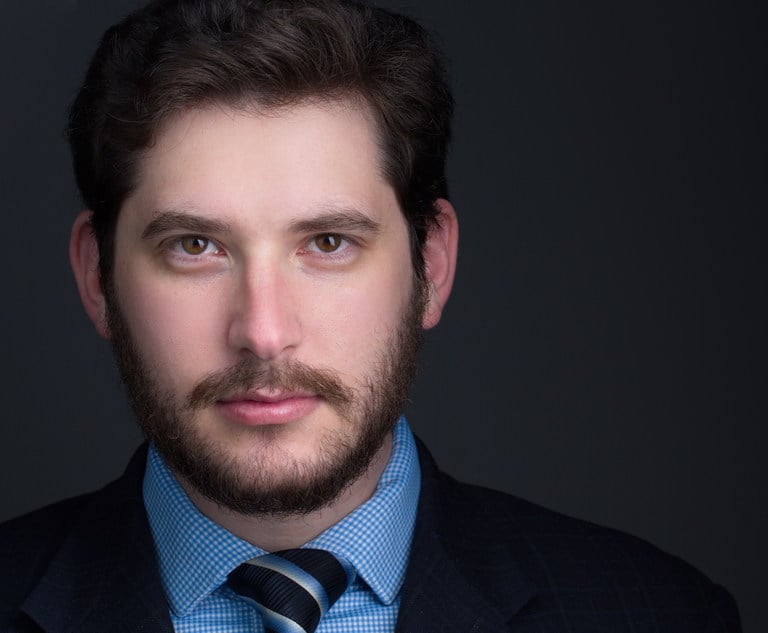Attorneys Weigh in as Judge in Parkland Shooting Case Threatens to Hold Sun Sentinel in Contempt
Broward Circuit Court Judge Elizabeth Scherer is presiding over the case of confessed shooter Nikolas Cruz, charged with the February mass shooting at Marjory Stoneman Douglas High School in Parkland, Florida. She threatened to hold two journalists and a newspaper in contempt for publishing information that the court had ordered redacted, but which was visible by pasting into another file.
August 16, 2018 at 03:25 PM
7 minute read
 Judge Elizabeth Scherer. Photo: Candace West
Judge Elizabeth Scherer. Photo: Candace West
Litigators and journalists are speaking out following tense proceedings in which a Broward judge Wednesday threatened to hold the Sun Sentinel and two of its reporters in criminal contempt of court.
On Aug. 15 Broward Circuit Court Judge Elizabeth Scherer chastised the Sun Sentinel and Dana J. McElroy, the newspaper's attorney and partner at Fort Lauderdale-based firm Thomas & LoCicero, over the publication of information that the court had previously ordered to be redacted.
 Meet the Broward Judge at the Helm of the Parkland School Shooting Case
Meet the Broward Judge at the Helm of the Parkland School Shooting Case
The incident in question began in early August when the newspaper, acting on a Facebook tip from a reader, realized that it was possible to view ostensibly censored material in a report by the Broward School District. The report detailed how the district had interacted with Nikolas Jacob Cruz, the 19-year-old who killed 17 people in a February mass shooting in Parkland.
Sun Sentinel reporters Brittany Wallman and Paula McMahon published a second story Aug. 4, revealing the newly discovered material that the court thought had been redacted.
The school district responded by filing a petition to hold the paper, Wallman and McMahon in contempt of court. Its Aug. 6 filing contends that the named parties ”engaged in indirect criminal contempt” and deliberately ignored a prior order by Broward Circuit Judge Patti E. Henning to withhold certain content in the report. It claimed the publication of the redacted information violated Cruz's trial and privacy rights.
Read the Broward school district's petition to hold the Sun Sentinel and its reporters in contempt:
The move infuriated Scherer, who is presiding over Cruz's criminal trial and the school district's petition to hold the paper and its journalists in contempt of court.
As seen in a video by shared WPEC-CBS12 from Wednesday's court proceedings, Scherer asked whether the reporters were present. When their attorneys said they weren't, the judge asked why.
“Well, certainly, I'm going to be discussing the possibility of holding them in contempt,” Scherer said. “I would think they would want to be present.”
When the the paper's attorneys said they were not aware the reporters were required to be in court, Scherer replied sternly.
“It's not a matter of requiring,” she said. “But if somebody is considering contempt proceedings, which could include a fine or jail, they didn't feel that making themselves available was important?”
McElroy explained that she, along with attorneys Mark R. Caramanica and Daniela Abratt, had filed a motion to dismiss the school district's petition on Aug. 10 and did not expect the court to ask the reporters to testify.
Scherer later said she would be willing to personally redact court documents and dictate in future court orders what the Sun Sentinel would and would not be permitted to published.
Just a day earlier, 30 media organizations, including The New York Times and the Washington Post, jointly filed an amicus curiae brief in support of the Sun Sentinel. The filing also called on Scherer to dismiss the school district's bid for sanctions.
Since Wednesday's contentious hearing, more litigators and media outlets are making their concerns about the district's filing—as well as Scherer's statements—known.
 Attorney Jeffrey S. Robbins of Saul Ewing Arnstein & Lehr. Photo: Dana J. Quigley
Attorney Jeffrey S. Robbins of Saul Ewing Arnstein & Lehr. Photo: Dana J. Quigley“When judges threaten to punish newspapers for publishing legally obtained info, this raises really dire constitutional issues of which, quite frankly, that court should have been well aware,” said media law attorney Jeffrey S. Robbins.
Robbins, who is a partner at Saul Ewing Arnstein & Lehr in Boston, said that, because the Sun Sentinel lawfully obtained the redacted document, the newspaper and the information are entitled to “the highest degree of constitutional protection.”
“For a judge to say that she thought she was entitled to dictate to a newspaper what they could and could not print from public records lawfully obtained ought to be a … matter of great concern for anyone who cares about the fundamentals of the First Amendment,” Robbins said.
Robbins also cited the precedent set by the U.S. Supreme Court in the Pentagon Papers case, which subjected the use of prior restraint—usually referring to censorship by a government entity made in reaction to a publicly made expression—to a heavy proof of burden.
“There is a great body of constitutional law that restricts the government's right or the court's right to engage in prior restraint … to the most dire example,” Robbins says, noting that such an example might include the publication of the route of military ships.
As for the district's contention that publication violated Cruz's rights, Robbins disagreed.
“The burden on anyone to demonstrate that any harm to Cruz's trial rights is so speculative, so doubtful,” he said. “It doesn't outweigh the public's right to know what public officials knew and when they knew it. This is the mother's milk of American democracy: how public officials perform and carry out their duties.”
 Mamie Joeveer, litigator with AXS Law Group
Mamie Joeveer, litigator with AXS Law GroupOther Miami-based legal experts told the Daily Business Review that, if the newspaper indeed obtained the redacted information legally, they were guaranteed the full safeguards of the law.
“The media is not required to refrain from publishing information that was obtained legally and that is relevant and a matter of public concern,” said Mamie Joeveer.
Joeveer, a litigation attorney with AXS Law Group, also chairs the Florida Bar's Media Law Committee.
“The media internally decides what information should be published in sensitive cases such as this one,” she said. “Any order by the Judge would have to be within the parameters of the Constitution.”
According to University of Miami law professor Caroline M. Corbin, the paper and its reporters would likely have the law on their side if Scherer were to hold them in contempt.
 University of Miami Professor of Law Caroline M. Corbin.
University of Miami Professor of Law Caroline M. Corbin.“The First Amendment probably protects the journalists if three things are true: They obtained the information legally; the information is truthful; and the information is a matter of great public concern,” Corbin said.
Likewise, Robbins said he does not imagine that Scherer will proceed with such actions, noting that there is a strong possibility it would be reversed upon appeal. He said he is “certain that the court will pay the appropriate level of heed to the substantial body of constitutional precedence that prohibits that kind of action.”
The Sun Sentinel's attorney, McElroy, declined to comment on the ongoing litigation. And the Broward school district's counsel, attorneys Eugene K. Pettis and Debra P. Klauber of Haliczer, Pettis & Schwamm, did not respond to requests for comment by deadline.
Broward County Public Schools spokeswoman Nadine Drew offered a statement saying: “It was never the School Board's intent to pursue contempt proceedings against the Sun-Sentinel or the individual reporters.” The district's statements adds that “such matters are more properly handled by the judges presiding over the litigation.”
Julie Anderson, editor-in-chief of the Sun Sentinel, told the Daily Business Review that she and the paper “feel as strongly today about our decision, as we did the day we published details of the uncensored report.”
“We believe the community had the right to know details of the Broward school district's mistakes in dealing with the student leading up to the massacre,” Anderson said. “We obtained the report lawfully on the school district's website, we weighed the importance of the story, and we published. The school district was under court order to redact information, not the press.”
This content has been archived. It is available through our partners, LexisNexis® and Bloomberg Law.
To view this content, please continue to their sites.
Not a Lexis Subscriber?
Subscribe Now
Not a Bloomberg Law Subscriber?
Subscribe Now
NOT FOR REPRINT
© 2025 ALM Global, LLC, All Rights Reserved. Request academic re-use from www.copyright.com. All other uses, submit a request to [email protected]. For more information visit Asset & Logo Licensing.
You Might Like
View All
Tragedy on I-95: Florida Lawsuit Against Horizon Freight System Could Set New Precedent in Crash Cases
2 minute read
'You Lied to the Jury': Veteran Awarded $5 Million in Defamation Case Against CNN
4 minute read
Vedder Price Shareholder Javier Lopez Appointed to Miami Planning, Zoning & Appeals Board
2 minute readTrending Stories
- 1Critical Mass With Law.com’s Amanda Bronstad: LA Judge Orders Edison to Preserve Wildfire Evidence, Is Kline & Specter Fight With Thomas Bosworth Finally Over?
- 2What Businesses Need to Know About Anticipated FTC Leadership Changes
- 3Federal Court Considers Blurry Lines Between Artist's Consultant and Business Manager
- 4US Judge Cannon Blocks DOJ From Releasing Final Report in Trump Documents Probe
- 5White & Case KOs Claims Against Voltage Inc. in Solar Companies' Trade Dispute
Who Got The Work
J. Brugh Lower of Gibbons has entered an appearance for industrial equipment supplier Devco Corporation in a pending trademark infringement lawsuit. The suit, accusing the defendant of selling knock-off Graco products, was filed Dec. 18 in New Jersey District Court by Rivkin Radler on behalf of Graco Inc. and Graco Minnesota. The case, assigned to U.S. District Judge Zahid N. Quraishi, is 3:24-cv-11294, Graco Inc. et al v. Devco Corporation.
Who Got The Work
Rebecca Maller-Stein and Kent A. Yalowitz of Arnold & Porter Kaye Scholer have entered their appearances for Hanaco Venture Capital and its executives, Lior Prosor and David Frankel, in a pending securities lawsuit. The action, filed on Dec. 24 in New York Southern District Court by Zell, Aron & Co. on behalf of Goldeneye Advisors, accuses the defendants of negligently and fraudulently managing the plaintiff's $1 million investment. The case, assigned to U.S. District Judge Vernon S. Broderick, is 1:24-cv-09918, Goldeneye Advisors, LLC v. Hanaco Venture Capital, Ltd. et al.
Who Got The Work
Attorneys from A&O Shearman has stepped in as defense counsel for Toronto-Dominion Bank and other defendants in a pending securities class action. The suit, filed Dec. 11 in New York Southern District Court by Bleichmar Fonti & Auld, accuses the defendants of concealing the bank's 'pervasive' deficiencies in regards to its compliance with the Bank Secrecy Act and the quality of its anti-money laundering controls. The case, assigned to U.S. District Judge Arun Subramanian, is 1:24-cv-09445, Gonzalez v. The Toronto-Dominion Bank et al.
Who Got The Work
Crown Castle International, a Pennsylvania company providing shared communications infrastructure, has turned to Luke D. Wolf of Gordon Rees Scully Mansukhani to fend off a pending breach-of-contract lawsuit. The court action, filed Nov. 25 in Michigan Eastern District Court by Hooper Hathaway PC on behalf of The Town Residences LLC, accuses Crown Castle of failing to transfer approximately $30,000 in utility payments from T-Mobile in breach of a roof-top lease and assignment agreement. The case, assigned to U.S. District Judge Susan K. Declercq, is 2:24-cv-13131, The Town Residences LLC v. T-Mobile US, Inc. et al.
Who Got The Work
Wilfred P. Coronato and Daniel M. Schwartz of McCarter & English have stepped in as defense counsel to Electrolux Home Products Inc. in a pending product liability lawsuit. The court action, filed Nov. 26 in New York Eastern District Court by Poulos Lopiccolo PC and Nagel Rice LLP on behalf of David Stern, alleges that the defendant's refrigerators’ drawers and shelving repeatedly break and fall apart within months after purchase. The case, assigned to U.S. District Judge Joan M. Azrack, is 2:24-cv-08204, Stern v. Electrolux Home Products, Inc.
Featured Firms
Law Offices of Gary Martin Hays & Associates, P.C.
(470) 294-1674
Law Offices of Mark E. Salomone
(857) 444-6468
Smith & Hassler
(713) 739-1250







